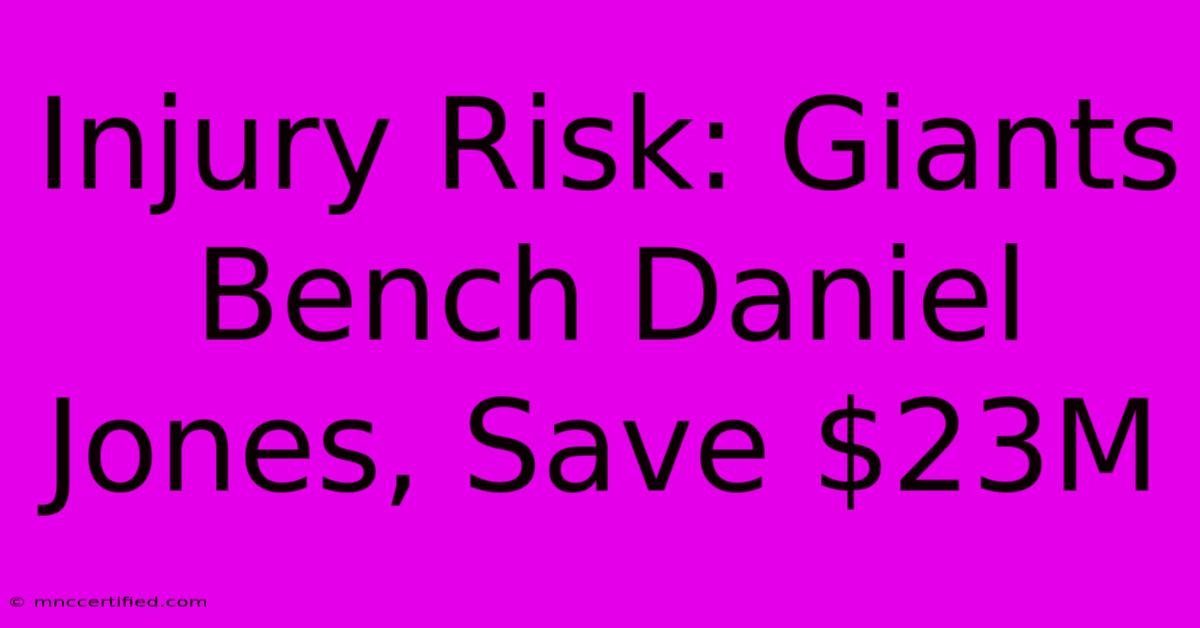Injury Risk: Giants Bench Daniel Jones, Save $23M

Table of Contents
Injury Risk: Giants Bench Daniel Jones, Save $23M – A Smart Move or Short-Sighted Gamble?
The New York Giants' decision to bench Daniel Jones, saving them a substantial $23 million, has sent shockwaves through the NFL. While financially savvy, the move raises critical questions about the team's long-term strategy and the inherent risks associated with prioritizing financial savings over potential on-field success. This article delves into the complexities of this decision, examining the injury risk, financial implications, and potential repercussions for the Giants' future.
The Financial Incentive: A $23 Million Question
The Giants' decision is undeniably driven by financial considerations. By benching Jones, they avoid triggering guaranteed money in his contract, resulting in a significant cost savings of $23 million. This substantial sum can be reallocated to other areas of the team, potentially strengthening their roster through free agency or the draft. However, is this short-term financial gain worth the potential long-term risks?
Weighing the Costs: Short-Term Savings vs. Long-Term Impact
The immediate benefit is clear: a significant boost to the team's salary cap. This allows for strategic investments in other players, perhaps addressing weaknesses in other areas of the team. But the cost of benching a starting quarterback, especially one with Jones's potential, could be far greater. A decline in on-field performance, a loss of team morale, and potential damage to the team's overall brand are all significant considerations.
The Injury Factor: A Calculated Risk?
A crucial aspect often overlooked is the inherent injury risk involved in playing professional football. While the financial implications are substantial, the Giants must also consider the potential for Jones to suffer a season-ending injury while playing. If this were to happen, the team would be left with a substantial financial burden and a gaping hole in their starting lineup. This underscores the complex nature of the decision and the delicate balance between financial prudence and on-field performance.
Assessing the Risk: Jones' Injury History and Future Potential
Analyzing Daniel Jones' injury history is critical. While not riddled with catastrophic injuries, any previous setbacks should be carefully considered. Furthermore, evaluating his potential – his ability to develop into a franchise quarterback – is vital. The Giants need to weigh the financial savings against the potential loss of a developing star player. Is the short-term financial gain worth potentially hindering his long-term development and future value?
Beyond the Money: The Impact on Team Morale and Brand Image
Benching a starting quarterback, particularly one who hasn't demonstrably underperformed, can significantly impact team morale. It can create uncertainty and potentially undermine team cohesion. The decision also has brand image implications; fans' reactions and the overall perception of the team will be influenced by this seemingly cold, calculated move.
Public Perception and Fan Engagement: Navigating the Backlash
The Giants must anticipate and manage the potential backlash from fans who feel this decision undervalues their starting quarterback. Maintaining open communication and transparency is crucial to mitigating negative consequences. Addressing concerns directly and explaining the rationale behind the decision – focusing on the long-term vision for the team – is paramount to managing public perception.
Conclusion: A Risky, Yet Potentially Rewarding Gamble
The Giants' decision to bench Daniel Jones to save $23 million is a complex one with significant implications. While the financial benefit is substantial, it is undeniably a risky gamble. The potential downsides – including impacts on team performance, morale, and public perception – must be carefully weighed against the short-term financial gains. Only time will tell whether this move will prove to be a shrewd financial maneuver or a short-sighted decision that ultimately harms the Giants' long-term success. The ongoing narrative will undoubtedly focus on the team's on-field performance and the ripple effects of this controversial decision.

Thank you for visiting our website wich cover about Injury Risk: Giants Bench Daniel Jones, Save $23M. We hope the information provided has been useful to you. Feel free to contact us if you have any questions or need further assistance. See you next time and dont miss to bookmark.
Featured Posts
-
Kremlin Issues Warning To Us On Ukraine
Nov 19, 2024
-
Attorney To Sue Insurance Company
Nov 19, 2024
-
Texas Louisiana Tornado Watch Issued
Nov 19, 2024
-
Arsenal Duo Win Nations League Group
Nov 19, 2024
-
Actor Paul Teal Dead A One Tree Hill Loss
Nov 19, 2024